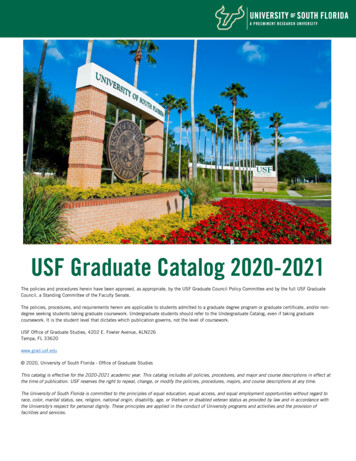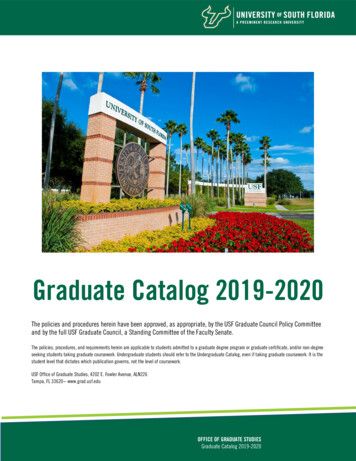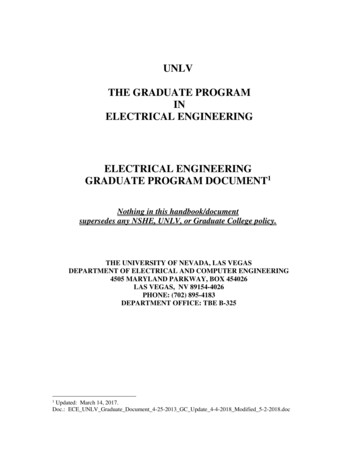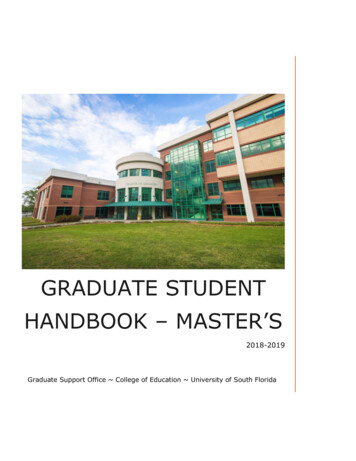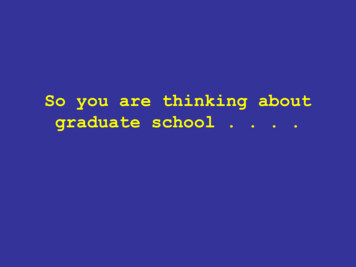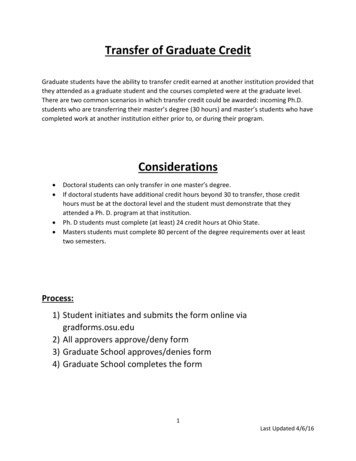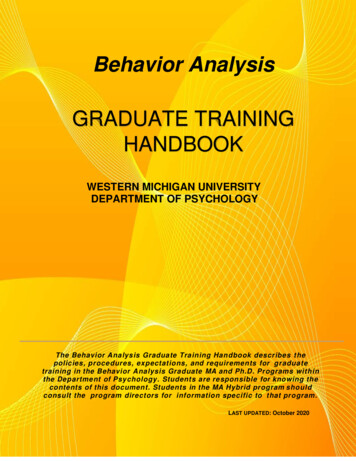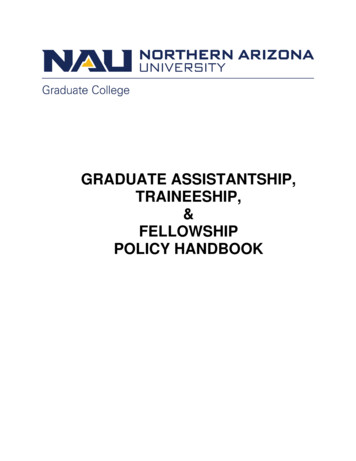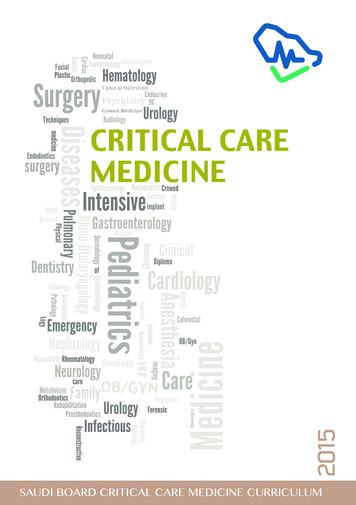
Transcription
Graduate Program inCritical and CreativeThinkingStudent HandbookVersion: January 2022Critical and Creative Thinking ProgramCollege of Education and Human DevelopmentUniversity of Massachusetts Boston100 Morrissey Blvd.Boston, MA 02125-3393http://www.cct.umb.edu/cct@umb.edu2
ContentsSection 1: About CCT . 5Contact Information and Office Location . 5A Very Brief History of the CCT Program . 5Welcome to Critical and Creative Thinking . 6Why a graduate program in Critical and Creative Thinking? . 7Degrees and Tracks. 8Course Requirements: Master of Arts in Critical and Creative Thinking . 9Course Requirements: Graduate Certificate in Critical and Creative Thinking . 10Course Sequence, Substitutions, and Exceptions. 11Course Formats . 12Additional Notes on Program Requirements . 13Course Completion . 13Reflective Practice Portfolio . 13Mid-Program Check-in . 13Capstone Synthesis . 14Exit Self-Assessment . 14Additional Requirements and Expectations of Students . 14CCT Academic Location: College of Education and Human Development . 16Academic Policies and Procedures . 16Transfer credits. 17Pre-matriculation credits: . 17Full-time Status. 17Course Enrollment Changes . 18Other Resources and Support for Students . 18CCT Monthly Newsletter . 18CCT Writing Workshop. 18Graduate Student Assembly (GSA) . 18Healey Library. 18IT Training. 19IT Services. 19Disability Services . 19International Students . 19Graduate Writing Center/Academic Support . 19Health Services . 20Social and Traditional Media at UMB . 20Public Safety . 20One Stop. 20Bookstore . 20Section 2: Applying and Admissions . 21Before You Apply . 21Application Procedures. 21Additional Notes for International Applicants . 22Costs . 22Financial Aid . 22CCT Graduate Assistantships. 22Section 3: Getting Started - Newly Admitted Students . 233
Accepting Admission. 23Checklist of First Steps for Newly Matriculated Students . 23Online Communication Notes . 23Entrance Interview . 23Student Advising. 24Guidelines to Help Faculty Serve Students . 24Section 4: Moving Through the Program. 25Registering for Courses . 25Mid-program/End-of-Semester Check-in . 25Pre-capstone Courses . 26Section 5: The Capstone Synthesis . 27Capstone Synthesis Course and General Requirements. 27Assessment of Capstone Synthesis . 27Notes on Preparation for Synthesis Project . 28Notes on Completing the Capstone Synthesis . 29Section 6: Graduating . 30Section 7: Beyond CCT: Opportunities and Resources for Graduates and the Wider Community. 31Publicity . 31CCT Community Open Houses . 31Collaborative Explorations . 32Appendix A: Research and Study Competencies . 33Appendix B: Capstone Options . 35Appendix C: CCT Faculty and Staff . 36Appendix D: Courses and Descriptions . 37Appendix E: Learning Outcomes . 464
Section 1: About CCTContact Information and Office LocationThe Graduate Program in Critical and Creative Thinking is part of the College of Education andHuman Development.Mail:Graduate Program in Critical and Creative ThinkingCollege of Education and Human DevelopmentUniversity of Massachusetts Boston100 Morrissey Blvd.Boston, MA 02125-3393CCT Program Office:Phone: (617) 287-7636Email: cct@umb.eduWheatley Hall, 4th FloorRoom W-04-170Parking: Campus lots, or Bayside Lot(free shuttle to the Campus Center)Subway: MBTA red line to JFK/UMassstop, then take free shuttle to theCampus CenterOfficial CCT Site:https://education.umb.edu/academics/graduate program/critical and creative thinking maCCT Public Community Site: http://blogs.umb.edu/cct/Email newsletter signup: http://eepurl.com/w1AynCampus map: https://www.umb.edu/the university/getting here/parking/mapA Very Brief History of the CCT ProgramThe Graduate Program in Critical and Creative Thinking began at UMass Boston in 1979 as acollaboration between the Philosophy and Psychology departments and their faculty and wasone of the first of its kind, along with a few other graduate programs emphasizing developmentof creativity around that same time. The original target audience for the program was primarilyteachers who were interested in a scholarly approach to developing critical and creativethinking in curriculum and teaching practice. In the many years since then, the program hascontinued to appeal to educators of many types as well as practitioners in all fields and the waythat critical and creative thinking is relevant to many environments and purposes. Today, theCCT program continues to serve students globally across many interests, such as social justice,school and community improvement, organizational leadership, media and informationliteracy, innovation in arts and sciences, and many other areas.5
Welcome to Critical and Creative ThinkingWelcome to the Critical and Creative Thinking Program, a unique and innovativeinterdisciplinary graduate program, one of just a few with an explicit focus on both creative andcritical thinking. The CCT Handbook provides a step-by-step guide to joining and movingthrough the Program. Additional information about CCT courses, events and otherannouncements can be accessed via the CCT website (www.cct.umb.edu).As an interdisciplinary, cross-college program, CCT looks to support "horizontal" exchanges andsupport among students and "vertical" exchanges between students and the larger communityof CCT alums and associates. These have coalesced into events of the CCT network and otherofferings open to the wider community of CCT current and prospective students, graduates,faculty, and all others.Each matriculated student has the CCT Program Director as their general CCT advisor butshould feel free to ask other faculty members for advice (see Appendix C). We want the timestudents spent consulting with faculty to focus as much as possible on issues of personal,professional, and intellectual development, so we have designed this handbook to enablestudents to handle most administrative matters on their own.While the name of the program conveys the idea that critical and creative thinking arefoundational to the program, this includes an essential focus on reflective practice. This involvesreflecting on our experiences, making meaning of those experiences, recognizing ourassumptions, and making decisions about our practices. In short, reflective practice helps us toturn understanding of our experiences into practical action. In that sense, this idea of reflectivepractice helps to convey how a program in critical and creative thinking is not simply about thetheoretical issues of what makes good thinking; it connects theory to practice by engaging us inprocesses and tools for thinking so that we can bring change to our organizations, fields, andcommunities.Finally, we view the CCT program as a work-in-progress, which means that we encouragemembers of the CCT community to find opportunities to affirm what is working well and tosuggest directions for further development. It helps our spirits to know that others are thinkingabout how the program can move ahead.Sincerely,Jeremy Szteiter, CCT Program Assistant Director6
Why a graduate program in Critical and Creative Thinking?RationaleThe Critical and Creative Thinking (CCT) program at the University of Massachusetts Bostonprovides its students with knowledge, tools, experience, and support so they can becomeconstructive, reflective agents of change in education, work, social movements, science, andcreative arts.Critical thinking, creative thinking, and reflective practice are valued, of course, in all fields. Incritical thinking we seek to scrutinize the assumptions, reasoning, and evidence brought to bearon an issue — by others and by oneself; such scrutiny is enhanced by placing ideas andpractices in tension with alternatives. Key functions of creative thinking include generatingalternative ideas, practices, and solutions that are unique and effective, and exploring ways toconfront complex, messy, ambiguous problems, make new connections, and see how thingscould be otherwise. In reflective practice we take risks and experiment in putting ideas intopractice, then take stock of the outcomes and revise our approaches accordingly.The rationale for a master’s program of study in CCT is that an explicit and sustained focus onlearning and applying ideas and tools in critical thinking, creative thinking, and reflectivepractice allows students involved in a wide array of professions and endeavors to developclarity and confidence to make deep changes in their learning, teaching, work, activism,research, and artistry. By the time CCT students finish their studies they are prepared to teachor guide others in ways that often depart markedly from their previous schooling andexperience. In these processes of transformation and transfer, CCT students have to select andadapt the ideas and tools presented by faculty with diverse disciplinary and interdisciplinaryconcerns. Students matriculated in the CCT program benefit from extended relationships withCCT faculty and fellow students that support their processes of learning — experimenting andtaking risks in applying what they are learning, reflecting on the outcomes and revisingaccordingly, and building up a set of tools, practices, and perspectives that work in their specificprofessional or personal endeavors.Impact of StudiesThe CCT Program appeals to students looking for professional and personal development whoare interested in learning from and with others of diverse backgrounds and interests. Many aremid-career educators or administrators across diverse environments. Others are policy makers,facilitators, or organizational leaders/program managers in government, corporate, scientific,or nonprofit settings. Still others are artists, musicians, writers, journalists, and communityactivists. Through course projects, pre-capstone research courses, and the capstone synthesisprojects, CCT students explore issues they have not had much chance to address before andtranslate what they learn into strategies, materials, and interventions for use in diverseeducational, professional, and social settings. Graduates leave CCT well equipped for ongoing7
learning, addressing the needs of their schools, workplaces, and communities, adapting andcontributing to social changes, and collaborating with others to these ends. Abstracts and fulltext versions of theses and capstone syntheses culminating from the MA program can beviewed at http://scholarworks.umb.edu/cct capstone/.Degrees and TracksDegrees offered:Master of Arts; Graduate CertificateStudents may be admitted for a Master of Arts or Graduate Certificate in Critical and CreativeThinking. Current Certificate students who wish to continue to the MA program must reapplywith a new full application.Tracks: Regular Critical and Creative Thinking TrackScience in a Changing World Track (SICW) (as of November 2019: currently not acceptingnew applications for this track). The choice of the Science in a Changing World trackpreviously allowed students to substitute science-themed courses for the typicalrequired courses in the regular track. See Appendix D for full descriptions of all requiredand elective courses.The entire program can be completed at a distance. Many courses are available in a hybridformat, where class meetings are held on campus, but those at a distance join the meetingsthrough video conference, participating live in all activities and discussions along with thosewho are attending in person. A few electives are offered only in fully online format, and so localstudents may end up having to take some courses this way.The CCT program is located in the College of Education and Human Development. Manyadministrative details about registration, costs, and college policies can be found here:https://education.umb.edu/academics/graduate program/critical and creative thinking ma8
Course Requirements: Master of Arts in Critical and Creative ThinkingStudents complete 11 courses (33 credits):Core courses (from multiple curricular areas):1. Curriculum Organization and Innovation (2 required courses)a. CrCrTh 601 Critical Thinkingb. CrCrTh 602 Creative Thinking2. Mediation, Dialogue, and Collaboration (1 required course; choose one of the followingrecommended courses OR identify another to substitute, with program director permission)a. Either CrCrTh 616 Dialogue Processes, or CrCrth 618 Creative Thinking, Collaboration,and Organizational Change3. Urban and Social Justice Education (1 required course; choose one of the followingrecommended courses OR identify another to substitute with program director permission)a. Either CrCrTh 615 Holistic and Transformative Teaching, or CrCrTh 627 Issues andControversies in Antiracist and Multicultural Education4. Research and Writing for Reflective Practice (2 required courses)a. CrCrTh 692 Processes of Research and Engagementb. CrCrTh 693 Action Research for Educational, Professional, and Personal Change5. Final Capstone Course (1 required course)a. CrCrTh 694 Synthesis of Theory and Practice (this course is only offered in the springterm and must be taken last; exception: one final elective may be taken in the summerfollowing this course with program director permission)Elective requirements:Students must take 4 additional courses from any other offerings across CCT. Some electivesmay come from other programs but must be approved in advance by the program director.Additional Requirements All students attend a one-on-one mid-program conference with their advisor to discusspossible capstone topics and start to prepare for the final research/writing courses.The capstone project involves submission of a paper and a public presentation on theproject. Although this project is carried out through course CrCrTh 694 Synthesis of Theoryand Practice, the submission of the capstone is a distinct requirement from the completionof the course (that is, the course can be completed without having the final capstone paperapproved, which might then extend a student’s formal study until the paper is finished).9
MA students complete additional requirements outside of course completion and thecapstone – the program Exit Self-Assessment, and the Reflective Practitioner’s Portfolio. Seethe upcoming section in this handbook called Additional Notes on Program Requirements.Course Requirements: Graduate Certificate in Critical and CreativeThinkingStudents complete 5 courses (15 credits):Core courses (2 required courses):a. CrCrTh 601 Critical Thinkingb. CrCrTh 602 Creative ThinkingElective requirements:Students must take 3 additional courses from any other offerings across CCT.10
Course Sequence, Substitutions, and ExceptionsNote that most required courses are offered once per year, and most electives are offered onceevery two years (pending instructor availability). Some electives are only offered veryoccasionally in recent years.The sequence is flexible; core courses do not need to be completed before other courses, andcourses can be taken in any order, except that: CrCrTh 692 and CrCrTh 693 are best taken when some other courses have beencompleted; these are not appropriate for a student’s first semester in the program. CrCrTh 694 Synthesis of Theory and Practice is offered only in the spring, and it must betaken last (exception: because of scheduling needs, it is allowable to have one finalelective remaining after 694 and take it in the following summer and then get an Augustgraduation). CrCrTh 692 must be completed before starting CrCrTh 694 (it is ok to take any othercourses concurrently with CrCrTh 694)Certain courses may be taken twice (up to 6 credits). These are: CrCrTh 611 Seminar in Critical Thinking (as long as it is taken with two differentinstructors, since the course theme varies based on instructor area of expertise; bothtimes count as electives) CrCrTh 612 Seminar in Creativity (as long as it is taken with two different instructors,since the course theme varies based on instructor area of expertise; both times count aselectives) CrCrTh 688 Reflective Practice CrCrTh 692 Processes of Research and Engagement (the first time counts as therequirement, and the second counts as an elective)Substitutions for core courses may be allowed but must be approved by the program director inadvance and only when a core course cannot be offered on schedule as needed by the studentfor graduation: CrCrTh 611 Seminar in Critical Thinking may substitute for CrCrTh 601 Critical Thinking CrCrTh 612 Seminar in Creativity may substitute for CrCrTh 602 Creative Thinking11
Course FormatsCCT courses are offered in either fully online or hybrid formats, although every course is notoffered every semester, and the format is subject to confirmation and instructor availability.Hybrid format involves regular class meetings (typically once per week), where local studentsmay attend on campus in a classroom with the instructor, and those at a distance join by webvideo conference so that both on-campus and online students participate together in alldiscussions and activities. In such cases, the registration system may list multiple class sectionsfor the course, so students should register for the section that corresponds to how they willattend.Some courses use a fully online format, where no on-campus attendance is possible – allstudents join meetings by web conference (“synchronous online”). All online courses areinstructor-led (not self-paced) and meet according to a predetermined schedule (typically onceper week, but some courses meet less frequently). A few online courses have few or no regularmeetings; most work is completed independently (“asynchronous”).Attendance at scheduled meetings is mandatory in most cases, although individual instructorsdetermine final requirements. Students are expected to attend every session and participatefor the entire session, so it is important to be able to commit to the meeting time, and if online,be in an environment that allows participating without distractions.Students who prefer face-to-face interaction can register for the on-campus sections of hybridcourses as often as they are available but should note that in recent years, local students arechoosing more and more to attend hybrid courses by web conference even when on-campusparticipation is possible, in order to reduce commuting time or transportation costs, or forother personal reasons. As a result, on-campus cohorts are likely to be quite small in number.Additionally, local students who prefer on-campus participation should still expect to take somecourses fully online along the way, in order to complete the program within their intendedtimeline and with their preferred electives.12
Additional Notes on Program RequirementsStudents must complete all of the following items to be awarded the MA degree:Course CompletionMost CCT courses are 3 credits. Courses are graded with standard letters, with a lowest possiblepassing grade of C for graduate courses. Coursework that does not reach the minimumqualifications for a C will be given an F. An overall average grade of B (Grade Point Average 3.0) or above is required for graduation.Reflective Practice PortfolioThe Reflective Practice Portfolio is an electronic portfolio of academic work completed over thecourse of the program. The two main components of the portfolio are the exhibits and thenarrative. For the exhibits, students choose one assignment from each course (or a selectionfrom a longer assignment) that best represents how their thinking developed through thatcourse. For each assignment, students then write a narrative (about one page of double-spacedtext) that describes how the chosen assignment shows a shift of thinking (between an earliertime in life and the point of that assignment, or between the beginning and end of the course).This description is written as a critical reflection – that is, it doesn’t only say what wasaccomplished through the selected assignment but also shows how the student is reflecting ontheir own assumptions and biases and the development that has happened as they werechallenged to bring new thinking into their lives or work.The Reflective Practice Portfolio requirement extends outside of the individual courses; effortneeds to be made independently and throughout a student’s CCT career to select the exhibitsfrom one’s coursework and write the narrative pieces. It is strongly recommended thatstudents work on the portfolio at the end of each term to more easily recall the context inwhich each selected assignment was completed.For more information, explanation of the rationale, and examples of Reflective PracticePortfolios, please see the web site: practice-portfolio/Mid-Program Check-inA brief interview with the Graduate Program Director is held at the mid-point of one’s progressthrough the MA program. This is explained further in the later section titled, “Moving Throughthe Program”.13
Capstone SynthesisThe capstone project (for the MA only) is a synthesis of one’s insight, learning, andpreparedness for change and ongoing development as a result of the program. This project iscompleted through participation in the CRCRTH 694 Synthesis of Theory and Practice seminar,which is taken at the end of the program (typically, this course is taken last, although somecourses, such as late electives, may be taken simultaneously).Exit Self-AssessmentA written self-assessment is completed by each student, typically in conjunction with the end ofthe CRCRTH 694 Synthesis course. This assessment asks students to document the broad impactof the program on their personal, professional, and educational development by identifyingareas of achievement and challenges in relation to two sets of goals: 1) completion of thesynthesis project itself, and 2) developing as a reflective practitioner. See Appendix E for fulltext of the goals. Students may wish to review these goals periodically throughout the programas a prompt in thinking about how to approach upcoming courses as well as reflect upon recentones. The exit self-assessment goals also provide some framework for thinking about how towrite the narrative parts of the Reflective Practice Portfolio.Additional Requirements and Expectations of StudentsIn addition to the coursework, check-ins, and portfolio requirements, students are requested toaddress the following on a regular basis: Students taking courses in the hybrid format will have registered for either an onlinesection or a face-to-face section. Students are generally expected to attend the courseconsistently with how they registered, because this affects instructor planning whencou
Welcome to Critical and Creative Thinking Welcome to the Critical and Creative Thinking Program, a unique and innovative interdisciplinary graduate program, one of just a few with an explicit focus on creative and/or critical thinking. The CCT Handbook provides a step
